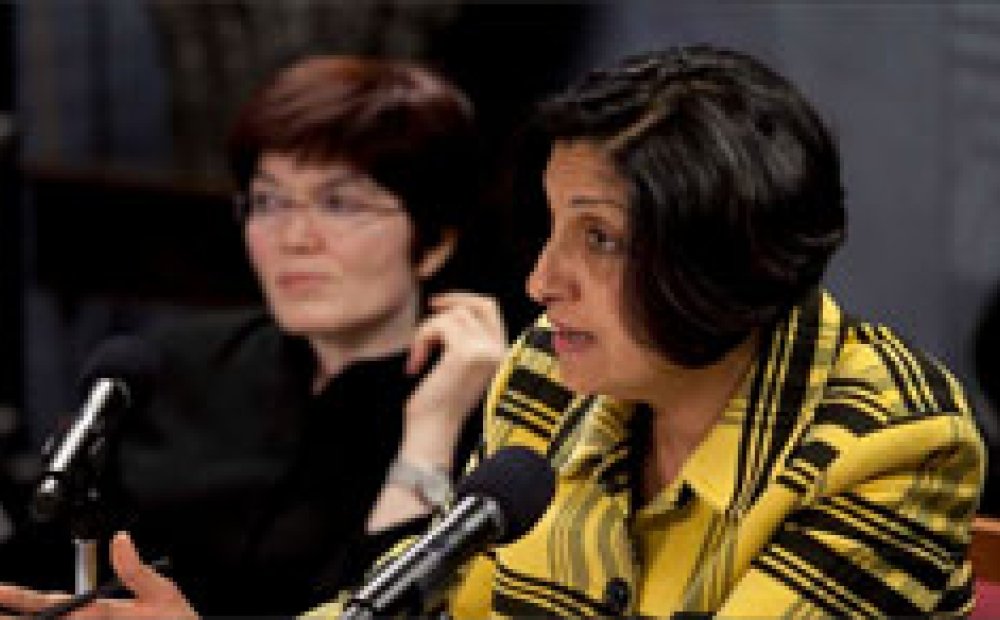Is There Another Path to Peace? Civil Society Leaders on the Peace Process

Female activists discussed the role of women and civil society in the Israeli-Palestinian peace process, emphasizing the need to include women from civil society to bring about peace that represents more than an absence of war. Members of The International Women's Commission (IWC) highlighted the opportunity and need to bring women from Israel, the Palestinian territories, and the international community to the negotiation table.
The Middle East Program of the Woodrow Wilson Center and The Institute for Inclusive Security hosted this panel discussion with Ingibjörg Sólrún Gísladóttir, Former Minister for Foreign Affairs of Iceland; Lama Hourani, Womens Rights Activist; and Molly Malekar, Former Director, Bat Shalom on March 4, 2010. The speakers were joined by Luisa Morgantini, former Vice President of the European Parliament and Schlomit Lir, Writer and Editor. Carla Koppell, Director of The Institute for Inclusive Security, moderated the event.
These women from the IWC indicated it is essential to develop a new negotiation framework to understand and address the peace process more fully by fostering dialogue and encouraging cooperation. Arguing the asymmetry between Israelis and Palestinians with regard to land, economic and political opportunity and humanitarian conditions requires attention, they also called for women from civil society to bridge conflicting narratives among Israelis and Palestinians by providing a just narrative of the conflict that acknowledges suffering on both sides. They also called for the active engagement of a third party to act as an honest broker and provide mediation, arbitration, and accountability in the process.
Malekar offered a mapping of the current political situation in the region, mentioning the rise of an ultra-nationalist government in Israel, the erosion of belief in the possibility of a two-state solution, the internal crisis of leadership within the Palestinians, and the lack of success from the U.S. administration and international community to act as fair, honest, and serious brokers. She also indicated there is a growing concern within the international community of the urgency because of the conflict's far-reaching effects.Speaking to this urgent issue, Gísladóttir specified the only way to a lasting and sustainable peace was through a nonviolent approach. She highlighted how the IWC, a political group comprised of Israelis, Palestinians, and members of the international community, has agreed to talk with one voice and one political mission. Their primary goals are to end the Israeli occupation of Palestinian territories without violence and to establish an independent, viable Palestinian state according to 1967 borders. The male political leaders mindsets are the biggest obstacle to peace, she contended, and they need help from civil society, women, and international society.
Hourani provided an overview of the history of the peace process and lack of women's inclusion, noting how Palestinian and Israeli women have been talking to each other since the late 1970s. While this has been a difficult process, she indicated women have continued to meet since then with the only interruption during the Second Intifada. Other than the Madrid Peace Conference, negotiations have not included civil society or women.
In addressing the possibility of a one-state solution, Lir emphasized that the IWC is clearly against a one-state approach because it denies the right to self-determination of a people. Morgantini also urged for settlements inside the occupied territories to stop immediately because their continuation undermines the future Palestinian state.
Drafted by Kendra Heideman on behalf of the Middle East Program
Hosted By

Middle East Program
The Wilson Center’s Middle East Program serves as a crucial resource for the policymaking community and beyond, providing analyses and research that helps inform US foreign policymaking, stimulates public debate, and expands knowledge about issues in the wider Middle East and North Africa (MENA) region. Read more
